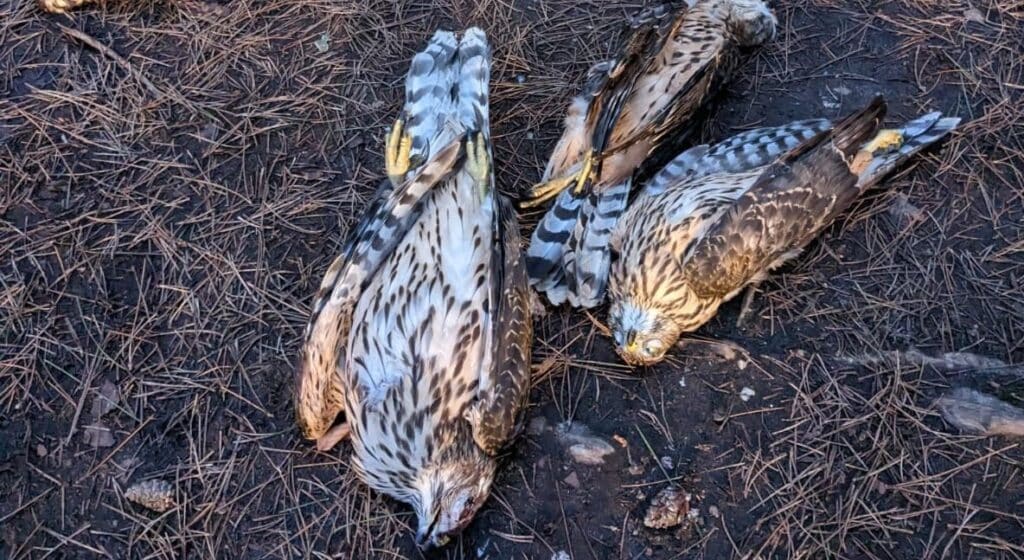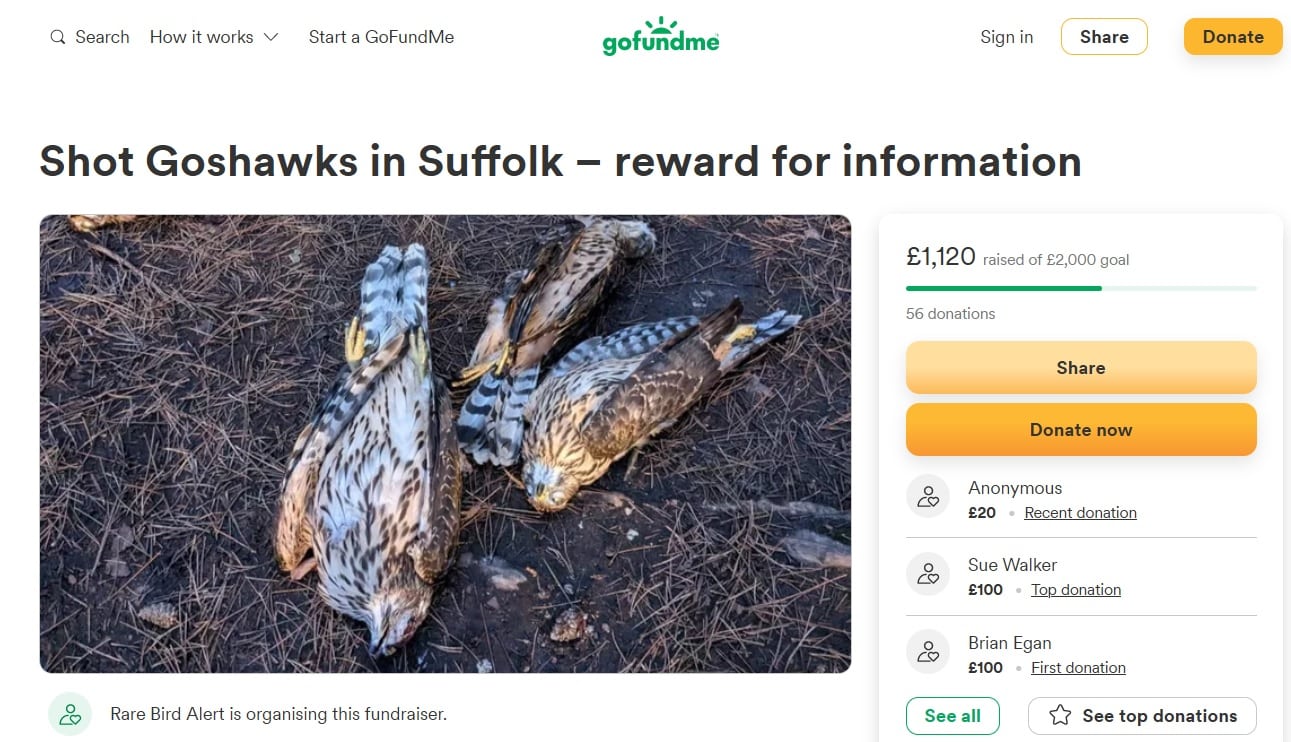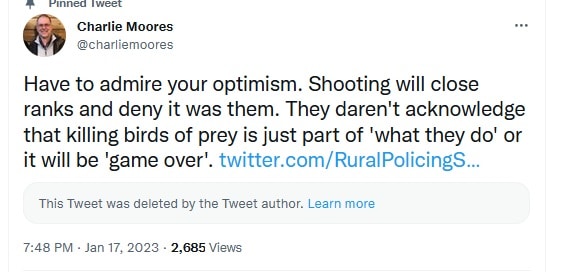On 17th January Suffolk Police’s Rural, Wildlife & Heritage Unit posted a request on their Twitter feed for information after the discovery of the bodies of five young (Northern) Goshawks dumped in Forestry England’s King’s Forest near Thetford in Suffolk.
The large and powerful birds – fully grown juveniles likely to have hatched just last summer – were found on the 16th of January at the Brandon end of the large car park area off the B1106, North Stow. They were taken away and x-rayed. All were found to contain shotgun pellets.
Goshawks are very rare in the UK but are typically found in forests or along forest edges where they hunt other birds (such as wood pigeons and corvids), and mammals including squirrels and rabbits. They are routinely persecuted on shooting estates which blame them for hunting the massive surplus of pheasants they produce for the gun. All birds of prey are of course fully protected by law.
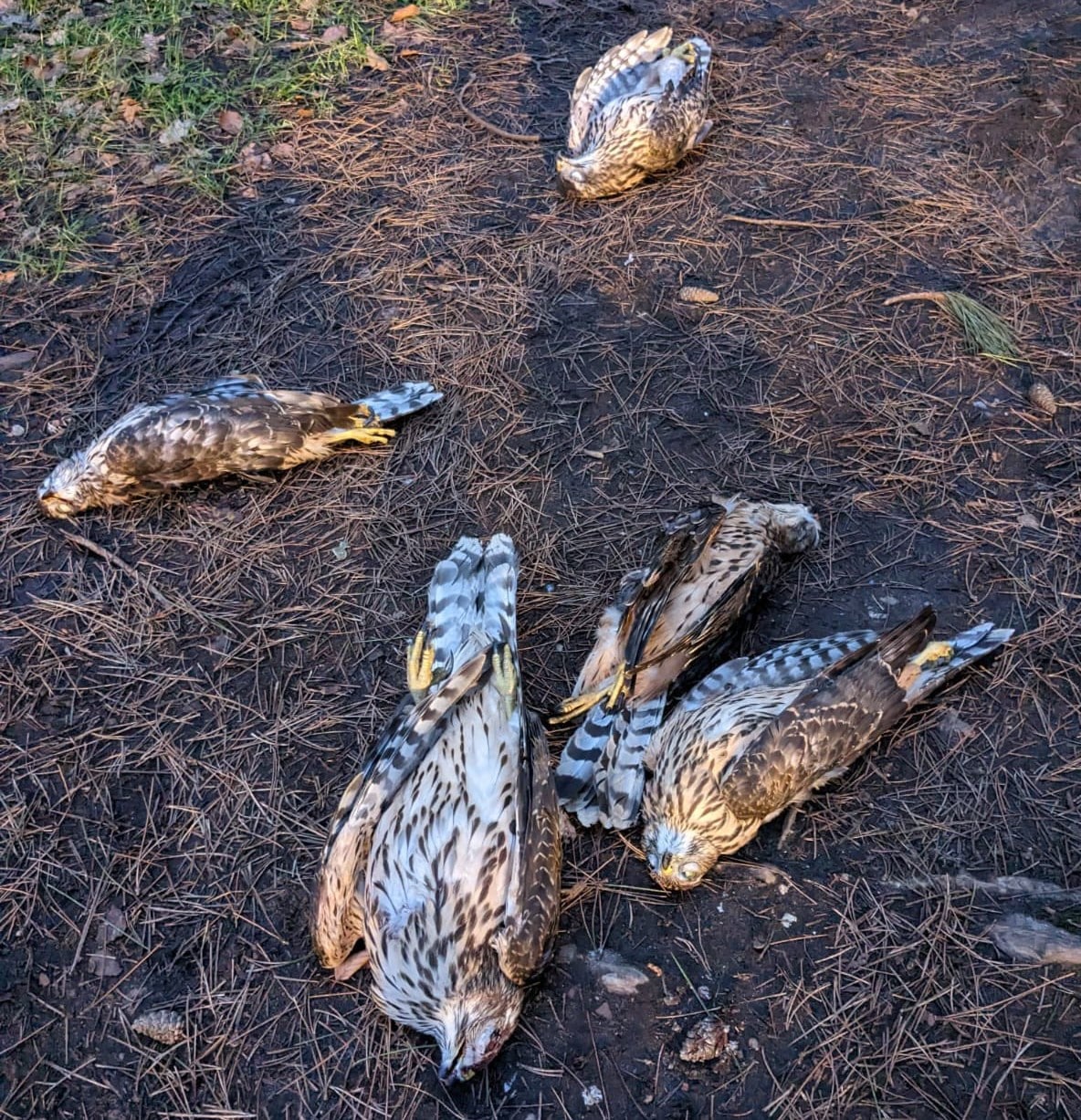
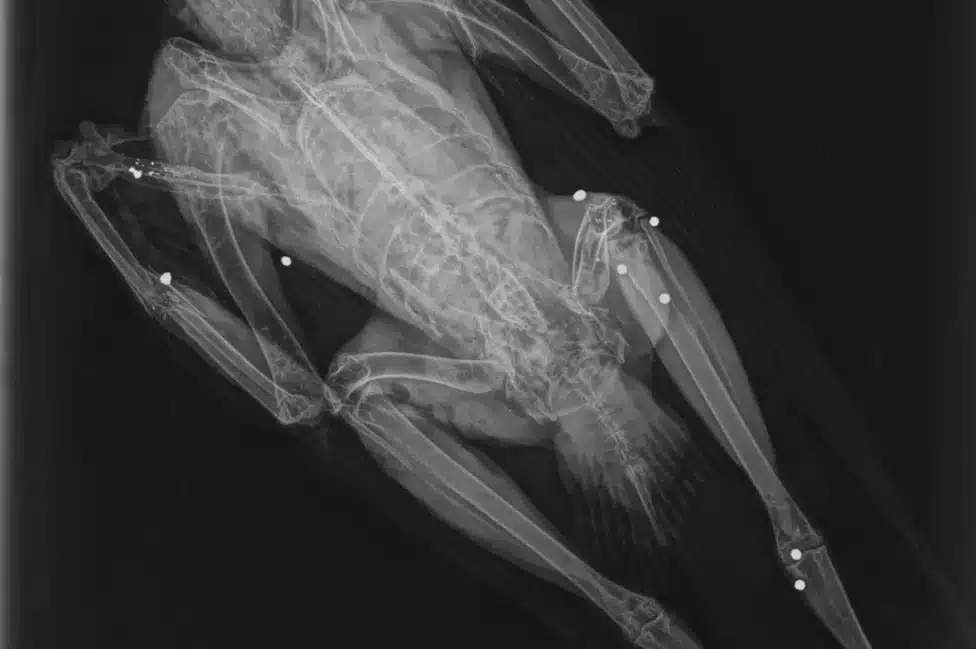
Deleted tweet
Suffolk Police’s tweet made a direct appeal to shooters, saying – in effect – that someone within the ‘shooting community” must know what had happened and that there should be no hiding place for the culprit. They are clearly as utterly sick of raptor persecution as we are.
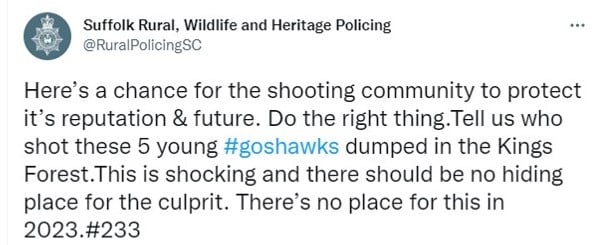
The tweet was deleted shortly after being posted and a gloating BASC (British Association of Shooting and (ahem) Conservation) made clear they were behind efforts to silence speculation that shooting was involved (it was of course captured multiple times as a screenshot). Like shooters in other parts of the country, BASC absolutely refuse to recognise that raptor persecution is endemic to their ‘hobby’.
Local police will always be more aware of criminal activity (or even rumours of criminal activity) than the general public, but it’s not difficult to work out why their suspicions will have fallen on shooting. North Stow is near many large shooting estates, including Elveden (who say their “deer stalkers and gamekeepers carefully manage our wildlife and game population”) and the huge Ampton Estate which (according to its website) offers “excellent partridge and pheasant shooting from the 50 or so drives on the estate”. Ampton even says that for the lazy shooter who doesn’t want to get their boots dirty “walking can be kept to a minimum if desired”. The estate recently hosted the Dunston Harriers point-to-point (amateur races that are financially critical to many cash-strapped fox hunts).
There is no evidence that a shooting estate is involved in these deliberate killings, but leaving aside the obvious question “Who else owns shotguns and would shoot Goshawks?”, as we have detailed in our species accounts for (Northern) Goshawk, Common Buzzard, Red Kite, and Hen Harrier, gamekeepers on estates routinely illegally kill birds of prey by shooting, poisoning, or trapping them (see for example ‘Yet more dead buzzards and yet another gamekeeper in court‘ from early January 2023) for supposedly taking ‘their’ pheasants or grouse. The most recent RSPB Birdcrime Report confirmed that the shooting industry continues to drive the illegal persecution of birds of prey, listing 108 confirmed incidents (often involving multiple birds) across Britain in 2021. The tally of dead birds includes 50 Common Buzzards, 16 Red Kites, seven Peregrines and three Goshawks.
Rewards offered
While the tweet has been deleted outrage has continued to build.
On 18th January the RSPB announced that their renowned investigation team were working with Suffolk Police and were offering a reward for information.
Part of the RSPB statement said that:
“The RSPB is working with Suffolk Police to help identify the culprit and has offered a reward of £5,000 to anyone who comes forward with information which leads to a conviction. This is the highest amount ever offered by the conservation charity, which has described the incident as ‘Utterly despicable.’
Goshawks are elusive birds of prey, around the size of a Buzzard, with yellow eyes and streaked undersides. They live quietly in forests in a handful of locations in the UK including Thetford Forest where these birds were found.
Mark Thomas, the RSPB’s Head of Investigations UK, said: “Anyone who values the natural world and abhors those who actively and criminally look to destroy it will feel as outraged as we do about this utterly despicable incident. We are calling on anyone who has information to come forward to the police.”
This was swiftly followed by Wild Justice, the campaigning organisation set up by Chris Packham and Drs Mark Avery and Ruth Tingay, which said that they would be matching the RSPB bringing the total to £10k.
On their website, Wild Justice summed up the anger many of us feel:
“We are sick to the back teeth of the relentless illegal persecution of birds of prey in the UK, which is mostly associated with land managed for gamebird shooting, be that Red Grouse, Pheasants or partridges. Indeed, it was our strength of feeling about raptor persecution, and our frustration at the failure of the Westminster and the devolved governments to tackle it effectively, that led to us founding Wild Justice in 2018. In partnership with the RSPB, we hope this substantial reward will encourage someone to come forward with information about whoever was responsible for this heinous crime, and that that information leads to a successful conviction“.
Finally, on the 19th of January Rare Bird Alert (a news service for birdwatchers that has become increasingly noteworthy for its environmentalism and campaigning) announced a Crowdfunder which by mid-afternoon had already passed its initial £1k target.
Will rewards work?
The question now is whether anyone with information will come forward?
The shooting industry (a blanket term for shooting estates, shooting syndicates, shooting lobbyists, gun and ammunition manufacturers and suppliers etc) rarely if ever come forward and denounce their own. Admitting that their business is underpinned by wildlife crime (and ceaseless fox and mustelid control to ‘protect’ pheasants, partridges, and grouse long enough for them to be shot), would finally force legislative change on the back of public anger.
Wages are notoriously low across the ‘blunt tool’ end of the shooting industry (the staff that actually do the dirty work on behalf of shoot owners), but traditionally there has been a code of silence amongst wildlife criminals. Jobs, housing, even personal safety, are often tied to keeping quiet about crimes. While the police (and perhaps the RSPB) will have a good idea who might have information, it’s unlikely that anyone will come forward – even when doing so could be spun as a huge positive for the industry as a whole.
There is almost zero chance the major lobbyists for shooting will do much more than mouth the usual platitudes about ‘bad apples’ and ‘zero tolerance’ and maintain that while there is no evidence to tie this crime to an individual or an estate it is wrong to place the blame on shooting. Self-appointed ‘guardians of the gun’ BASC (which was originally called Wildfowlers’ Association of Great Britain and Ireland) predictably have kept the pressure on both the police and the media to quash speculation, proving that just as in the pressure applied to Dorset Police to halt its investigation into a poisoned young White-tailed Eagle found dead on a shooting estate how much influence shooting has.
As we said above though, who else would kill young Goshawks? Few people even own a shotgun, and it’s doubtful that most of the UK would be able to recognise a Goshawk let alone target and shoot one (or five). By never delivering criminals to the police, BASC and the rest of the industry only has itself to blame if suspicions automatically fall on shooters. As we have said many times on this site, raptor persecution will end almost overnight once the bird shooting industry has been shut down.
-
Anyone with any information is asked to contact Suffolk Police, quoting crime reference 37/3027/23. Alternatively, call the RSPB’s dedicated Raptor Crime Hotline anonymously on 0300 999 0101.

